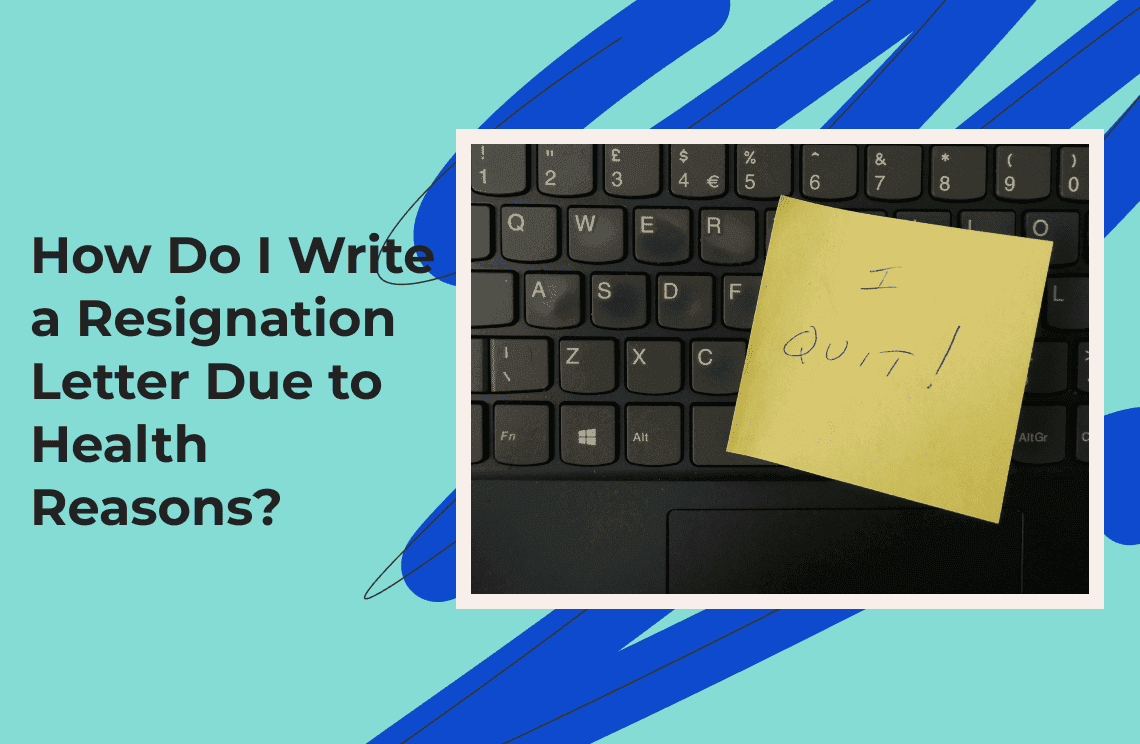Leaving a job is something most people would have to do at one point or another. There are many reasons to do it as well. Oftentimes, it is because you may have found a better career opportunity elsewhere. Other times, it may be because the current job no longer gives you the fulfillment or happiness you are looking for. Or there could be a myriad of other reasons. No matter what it is, an important part of leaving is to submit a resignation letter.
When resigning due to health reasons, it’s important to approach the situation thoughtfully and professionally. A well-crafted resignation letter ensures that you maintain your dignity and professionalism while explaining your circumstances. This article will guide you through the process of writing a resignation letter for health reasons, providing a sample to help you get started.
Importance of Writing a Resignation Letter
A lot of companies do not specifically require employees to submit a formal resignation letter if ever wish to leave their positions. However, this common practice does serve a lot of purposes for both parties involved.
For the employer, a resignation letter gives them a heads up that a worker is about to leave. Thus, they will have ample time to find or train a replacement and do other tasks necessary for smooth transitions. For the employee, submitting a well-written resignation letter would reflect positively on their professional image. It shows respect for the employer and the work environment, which future potential employers would find admirable quality.
How Do You Write a Resignation Letter?
Writing a resignation might seem an intimidating task at first but it’s really not that hard. Even if you have never written one before, there’s no reason to fret. There are plenty of free resignation templates online that are available for you to use. PDF Agile, for example, has some excellent templates you can use depending on the reason for your resignation. All you have to do is fill in the blanks with the correct information and you’re good to go.
Of course, you can also choose to write your resignation letter from scratch. Some find this method to be easier and much more sincere. Here are some basic steps that you can follow to craft a well-written resignation letter.
- State your intention to resign. Right after the salutation, state your intention to resign in clear and concise words. There’s no need to beat around the bush. Be sure to specify your intended last working day, keeping in mind that you would have to give at least two weeks’ notice.
- Express gratitude. Thank your employer for the opportunities and experiences that you have had during your tenure with the company. You can cite one or two specific instances that you appreciate during your stay.
- Offer assistance. During the notice period, offer to help in whatever way you can to make the transition as smooth as possible. Maybe you can train your replacement, or turn over ongoing projects to the selected person or team.
- Be professional. Although you might feel emotional about your departure, be sure to maintain a formal and professional tone in writing the resignation letter. Refrain from sharing too much detail or mentioning any negative opinions.
- Proofread your letter. The quality of writing should be up to par even if you are about to leave. Make sure there are no errors in spelling, grammar, or punctuation. Don’t rely on an auto spellcheck because this is not always completely reliable.

What to Include in a Resignation Letter Due to Health Reasons?
As mentioned, there are plenty of templates that you can use for writing a resignation letter. These templates usually have all the key elements in place, and all you have to do is fill in the data. But what if you are planning to resign for a rather unorthodox reason, say due to health reasons?
Finding a template for such a resignation letter may not always be easy. It can also be a bit tricky to write on your own for a few reasons. Should you elaborate on your medical condition? What if you have to leave right away – is it acceptable to resign without ample notice?
1. Acknowledgement of Circumstances
The steps that we have listed above still apply to a resignation letter due to health reasons. You can follow the same procedure in drafting your letter. But in this case, you might want to also include a brief mention of your health condition. This is where some uncertainty might set in.
On one hand, you might want to be upfront about the reason for your departure. But on the other hand, you might not be very comfortable about disclosing certain details of your medical condition. Fortunately, you are by no means obligated to reveal any details unless you want to. The entire section about mentioning your health situation is completely optional. You can just say that your resignation is health-related, and leave it at that.

2. Addressing an Abrupt Resignation
In many cases where someone resigns due to health reasons, the departure has to be immediate. Obviously, in such cases of sudden departures, the customary two weeks’ notice would no longer apply. You don't need to worry about it so much as most companies will not hold you liable if you are unable to give two weeks' notice or any kind of notice for that matter. Just indicate in your letter that an abrupt departure is necessary, and your employer would most likely understand.
Best Practices for Writing a Resignation Letter
Employers often give generous leeway when an employee resigns due to health reasons. That is, you don’t necessarily have to go through all the usual procedures. However, if you are at all capable of going through the process, then by all means, you should proceed accordingly. This would make for a smoother transition and also reflect well on your professional reputation.
Scenario 1: Submit the Letter Personally
The best way to submit a resignation letter is to print it out and hand it to your manager in person. A face-to-face submission will give both parties the chance to address any pending concerns and deal with the transition more efficiently. This personal interaction also allows you to express gratitude, clarify your reasons for leaving, and provide feedback if necessary. Resigning adds a personal touch, demonstrating respect for your employer and creating a more transparent and professional departure.

Scenario 2: Send an Email Copy as Follow-Up
Even if you have already submitted your letter by hand or by mail, it is advisable to send an email copy of the letter as well. This way, everyone will have a digital copy for easier filing and tracking. The email should be polite and professional, confirming that you've handed in your resignation and ensuring that your manager has a written record of it. Sending the email will also serve as a reminder of your resignation and facilitate further discussions, such as planning your last working day and handing over tasks.
Scenario 3: Maintain Professionalism
During the transition period, if any, and even after your resignation takes effect, make sure to keep a professional attitude. This will help preserve the positive professional relationships you have built within the company, and will work in your favor when you recover and decide to come back at a later time. Maintaining professionalism involves continuing to meet deadlines, assisting with the transition, and respecting the company’s policies. Keeping a positive attitude ensures that you leave on good terms, which can benefit your reputation and future job opportunities.
Sample Resignation Letter Due to Health Reasons
When resigning because of health reasons, it is vital to maintain professionalism in writing your resignation letter. At the same time, you must also be mindful of your privacy and your comfort in disclosing sensitive information about your condition.
Here is a sample resignation letter due to health reasons. You can just insert the relevant details and also customize the letter to make it fit perfectly with your particular situation.
[Your Name]
[Your Address]
[Your Phone Number]
[Date]
[Manager’s Name]
[Manager’s Title]
[Company Name]
[Company Address]
Dear [Manager’s Name],
I am writing to formally resign from my position as [Your Job Title] at [Company Name], effective [Last Working Day]. This decision was not made lightly, but due to health-related circumstances, I must prioritize my well-being and focus on recovery.
I am deeply grateful for the support and opportunities that you have given me during my time at [Company Name]. Working alongside such a dedicated team has been a rewarding experience, and I appreciate everything I’ve learned here.
I will do my best to ensure a smooth transition and complete any pending responsibilities. Please let me know how I can assist during this time.
Thank you for your understanding. I hope to remain in touch and wish [Company Name] continued success in the future.
Sincerely,
[Your Signature]
[Your Name]
Conclusion
Resigning due to health reasons can be a challenging situation, both emotionally and professionally. However, by following the guidelines outlined in this article, you can craft a respectful and professional resignation letter that ensures a smooth transition. Remember to prioritize your health and well-being, and don't hesitate to seek support from your employer or healthcare provider during this time.
Need a professionally crafted resignation letter? Check out our templates at PDF Agile Template Centre for easy customization and a seamless resignation process.






